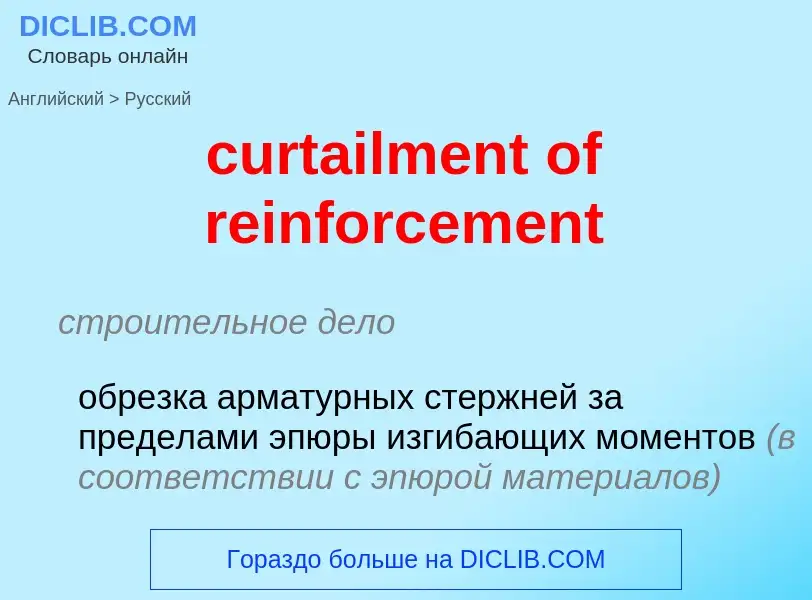Translation and analysis of words by ChatGPT artificial intelligence
On this page you can get a detailed analysis of a word or phrase, produced by the best artificial intelligence technology to date:
- how the word is used
- frequency of use
- it is used more often in oral or written speech
- word translation options
- usage examples (several phrases with translation)
- etymology
curtailment of reinforcement - translation to russian
строительное дело
обрезка арматурных стержней за пределами эпюры изгибающих моментов (в соответствии с эпюрой материалов)
общая лексика
негативное подкрепление
медицина
отрицательное подкрепление
строительное дело
рабочая арматура, воспринимающая усилия от отрицательных изгибающих моментов (в зоне промежуточных опор)
Definition
.
Wikipedia
In reinforcement theory, it is argued that human behavior is a result of "contingent consequences" to human actions The publication pushes forward the idea that "you get what you reinforce" This means that behavior when given the right types of reinforcers can change employee behavior for the better and negative behavior can be weeded out.
The model of self-regulation has three main aspects of human behavior, which are self-awareness, self-reflection, and self-regulation. Reinforcements traditionally align with self-regulation. The behavior can be influenced by the consequence but behavior also needs antecedents. There are four types of reinforcement: positive reinforcement, negative reinforcement, extinction, and punishment. Positive reinforcement is the application of a positive reinforcer. Negative reinforcement is the practice of removing something negative from the space of the subject as a way to encourage the antecedent behavior from that subject.
Extinction involves a behavior that requires no contingent consequence. If something (good or bad) is not reinforced, it should in theory disappear. Lastly, punishment is an imposition of aversive consequence upon undesired behavior. Punishment by removal is a common example or removing a benefit following poor performance. While reinforcement does not require an individual to consciously perceive an effect elicited by the stimulus, it still requires conscious effort to work towards a desired goal.
Rewarding stimuli, which are associated with "wanting" and "liking" (desire and pleasure, respectively) and appetitive behavior, function as positive reinforcers; the converse statement is also true: positive reinforcers provide a desirable stimulus. Reinforcement does not require an individual to consciously perceive an effect elicited by the stimulus. Thus, reinforcement occurs only if there is an observable strengthening in behavior. However, there is also negative reinforcement, which is characterized by taking away an undesirable stimulus. Changing someone's job might serve as a negative reinforcer to someone who has back problems, (e.g. changing from a laborer's job to an office position).
In most cases, the term "reinforcement" refers to an enhancement of behavior, but this term is also sometimes used to denote an enhancement of memory; for example, "post-training reinforcement" refers to the provision of a stimulus (such as food) after a learning session in an attempt to increase the retained breadth, detail, and duration of the individual memories or overall memory just formed. The memory-enhancing stimulus can also be one whose effects are directly rather than only indirectly emotional, as with the phenomenon of "flashbulb memory," in which an emotionally highly intense stimulus can incentivize memory of a set of a situation's circumstances well beyond the subset of those circumstances that caused the emotionally significant stimulus, as when people of appropriate age are able to remember where they were and what they were doing when they learned of the assassination of John F. Kennedy or September 11 terrorist attacks.
Reinforcement is an important part of operant or instrumental conditioning.


